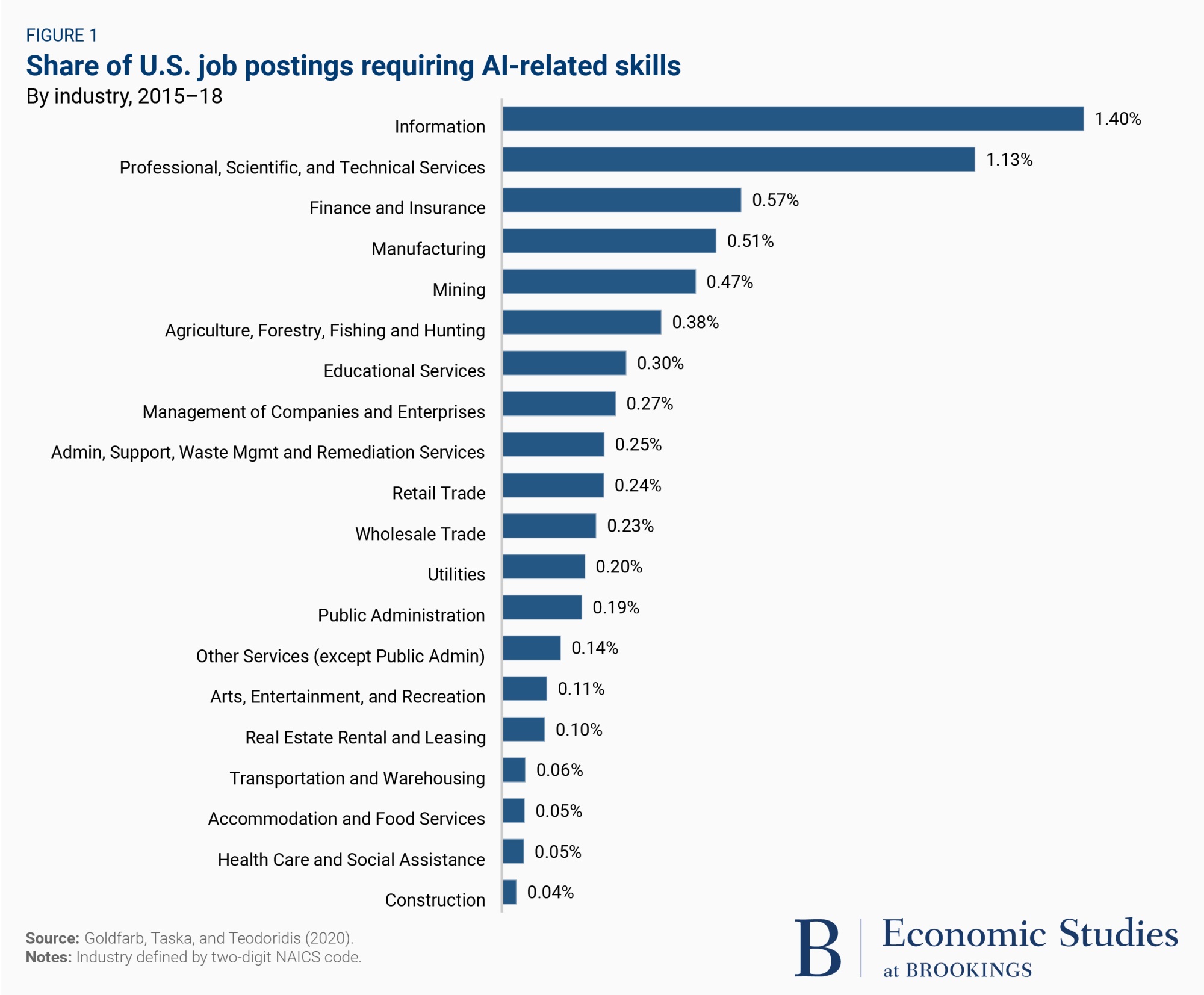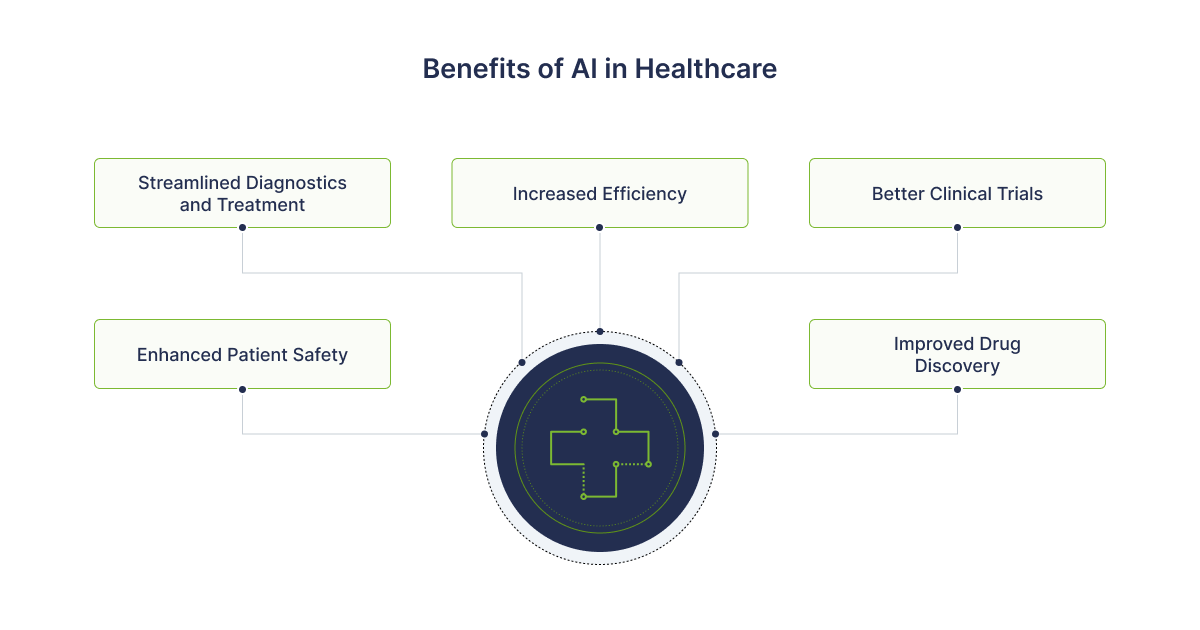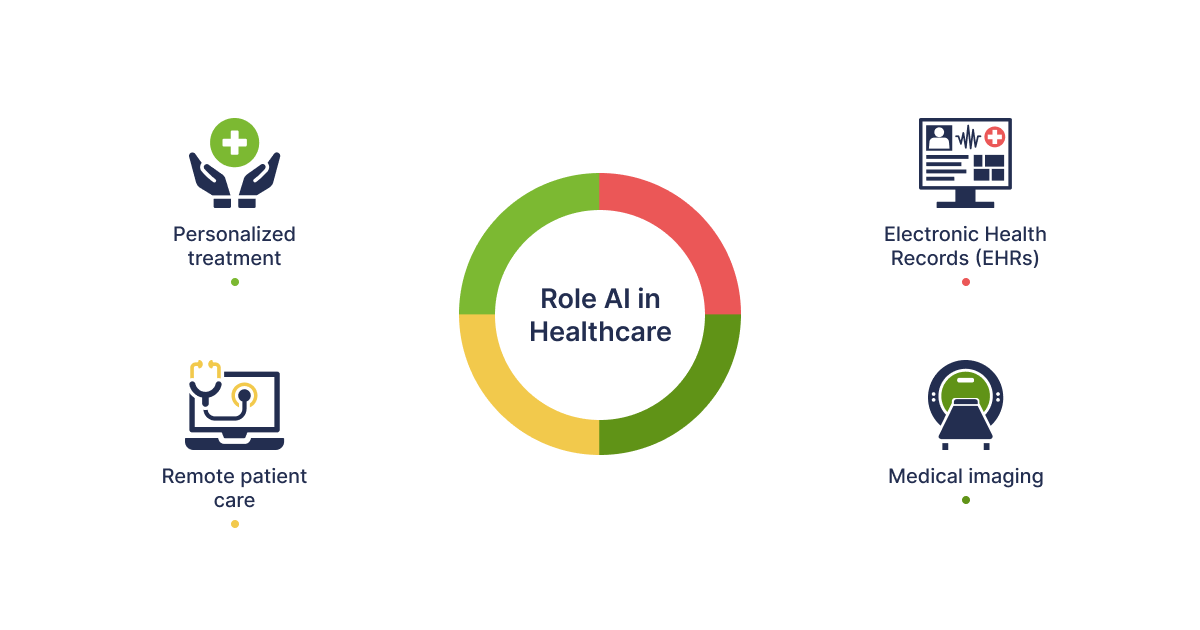AI for Healthcare
AI is an IT technology that has moved the development of products for various business areas to a significantly new quality level. Healthcare industry is no exception: the integration of AI in medical data management systems enables more efficient work with key information, which means improving the quality of services provided. However, statistics show that the implementation of AI in healthcare is slower than desired.
Despite the slow pace of technology development in medicine, about 85% of heads of medical institutions adhere to AI strategies in their work. This is evidently shown by the research of the Brookings Institution group done in December 2021.

Natalie Shibell, a vice president and a director of health research at Forrester Research, highlights the need for AI to solve health problems. The technology is especially relevant in working with chronic diseases, with a shortage of staff in the field and the re-hospitalization of patients. These circumstances stimulate medical service providers to implement technology. For example, AI improves data flow by properly recognizing and processing structured and unstructured data. In the future, AI will be used for searching and generating ideas that may not be visible to employees who are directly involved in these issues. Below we will describe what the advantages of using AI in medical practice are, as well as how the possibilities of AI are implemented in applications for medicine.
Benefits of AI in Healthcare

AI experts claim, that despite the huge amount of data used in the healthcare industry, about 97% of the information is not processed and taken into work properly. The reason for this situation is the lack of structuring information. So, x-rays, records attached with them, and data in a different format often remain outside the attention of specialists due to the fact that they were not included in the relevant sections. The problem can be solved by machine learning technologies, AI image processing, as well as natural language processing - NLP, with which you can search, query, and recognize medical information. A great example of implementing technology in an application is Amazon HealthLake, which is designed to search and query unstructured data.
In addition, AI has appeared to be widely applicable in medicine - in certain areas of work and as a factor icontributing to analytics improvment. How is AI useful in healthcare?
One promising area is the search for documentation for cancer research. The Fred Hutchinson Cancer Center has applied NLP at Amazon Comprehend Medical to analyze massive amounts of data relating to cancer patients' case histories. The information obtained was compared with clinical studies, which made it possible to process statistical information and identify patterns of the disease. Due to the large number of criteria that must be taken into account when searching for information, the case history had to be read in full, which significantly slows down the work and lies on the shoulders of the staff. With the use of NLP, this problem disappeared.
AI solves problems in healthcare when there are difficulties in treating kidney diseases. Thus, AI and machine learning become useful when it is necessary to evaluate and interpret the image obtained as a result of radiology or histopathology, as well as photos from a smartphone, which are taken to diagnose patients.
Another aspect of the application of machine learning is a prediction of the results of treatment, in particular, during hospitalization or COVID-19. To assess the state of the patient's vessels, images from smartphones and tablets are processed using deep learning technology.
Read also: Unleashing the Power of AI in Crafting Next-Generation Mobile Apps
Other benefits of AI in healthcare industry:
- Improved analysis of medical images, which allows you to make diagnoses with greater accuracy and plan further treatment.
- Provides monitoring of the state and dynamics of recovery, which contributes to a qualitative improvement in the patient's health status and provides information to the medical staff in real-time.
- AI is indispensable in the analysis of blood samples. The use of IT technologies is aimed at a more accurate and objective analysis of physiological fluids for the early detection of diseases and the speedy recovery of the patient with the least consequences for the body.
- Analysis of medical reports and records for detailed processing of a large amount of information. Detailed data analysis allows you to rationalize the decision-making process and provide an individual approach to the provision of medical services to patients.
- AI-assisted apps make it possible to avoid the need to expand staff while increasing the number of patients served. In addition, the technology will sort each clinical case and group similar ones based on multiple criteria, providing virtual support to the patient.
- AI-powered chatbots. Virtual assistants and AI-powered conversational chatbots have taken center stage, popping up in hospitals, labs, pharmacies, and even nursing homes. These self-service tools are also a more personal way of interacting with healthcare services than browsing a website or communicating with an outsourced call center.
A Case of AI Use in Healthcare

How is AI used in healthcare? Today, there are several trends that will intensify in the coming years.
Natural Language Processing and Conversational AI
NLP and conversational AI have become some of the most used components. However, Shibell argues that the use of virtual assistants will increase in the near future. “Assistants will improve their performance in the tasks of checking symptoms, and the analysis itself will become more complex and widespread. This will help to quickly and accurately divide patients into two groups: those who need emergency medical care, and people who will be served by a primary care doctor.”
Conversational AI will help the patient prepare for the appointment and even indicate the route to visit the hospital. This may include advice on whether fasting is required before visiting, what clothes to wear, and what manipulations to carry out before the visit.
Automated planning
The transition of medicine to primary health care causes the widespread use of automated planning. This is convenient not only for the patient but also for the healthcare provider.
Medical imaging
Medical imaging is a critical application area for artificial intelligence (AI) in healthcare. The ability of AI algorithms to accurately analyze medical images, such as computed tomography (CT), magnetic resonance imaging (MRI), and X-rays, allows healthcare professionals to gain critical insights into the condition of patients. This technology improves the accuracy and speed of diagnosis, improving patient outcomes. Here are some specific examples of the application of AI in medical imaging:
Radiology - AI algorithms can analyze radiological images such as X-rays and CT scans to help diagnose diseases such as pneumonia and tuberculosis.
Diagnosis and treatment - AI can analyze medical images and help medical professionals diagnose and treat diseases. For example, AI algorithms can detect brain tumors by analyzing MRI scans and help with surgical planning.
Read also: Healthcare ERP Solutions: Comparison of Key Features
Remote patient care
AI-powered virtual assistants can monitor patients remotely, allowing doctors to monitor patients' health even if they are not in the same room. Patients with chronic conditions such as diabetes may benefit especially. Besides, patients will be able to manage their condition more effectively and reduce the likelihood of complications.
Electronic Health Records (EHRs)
Electronic health records (EMRs) play a vital role in modern healthcare. AI technology is becoming increasingly important for managing electronic health records. Healthcare professionals can use AI to analyze large amounts of medical data to identify patterns and trends that can help prevent and treat diseases.
Personalized treatment
Experts in the field of AI admit that in a situation where medical staff can work with unstructured data, the development of diagnostics and personalized care will improve significantly. At the same time, indexing cannot be an alternative to structuring, as medical service providers would not like it. Mistakes are made during the indexing process, and the cost of such an operation is considerable. At the same time, structuring data through developer tools relieves staff from routine work and gives employees the opportunity to focus on their core business - patient care.
Integration of Omics, electronic medical records, and wearable devices
In the future, the possibility of combining Omics (biochemical analyzes - metabolomics, genomics, transcriptomics) with electronic medical records and information from portable devices is seen. Such records, combined with Omics data, will help distinguish between patient phenotypes.
Tighter government regulation of AI in the future
It is envisaged that the AI regulation process will tighten in the near future, at least in the US and European countries. Startups will be based on AI technology, which actualizes a number of problems related to AI management, data access, etc. To provide tighter control, a transition from the domain of the medical decision support system to the domain of medical devices is possible.
AI-Powered Healtcare Product Development
Software Development Hub conducts its own research in the field of AI and machine learning to implement innovative data-driven software solutions. Our scientific research is supported by the Department of Software Engineering and Management Information Technologies of Kharkiv Polytechnic Institute. We also create integrations of ready-made AI tools into healthcare software products. Our team will help you achieve high-performance levels while improving the quality of patient care by incorporating AI into your institution's workflows. The use of AI components will avoid delays in the analysis of medical images and make decisions faster and more accurate.
Our portfolio includes medical information systems, e-Prescription systems, applications for tracking medicines with a QR scanner, medical ERP systems, etc.
Categories
Share
Need a project estimate?
Drop us a line, and we provide you with a qualified consultation.








